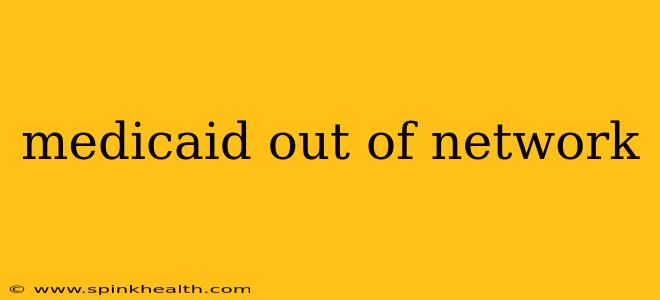The world of healthcare can be confusing, and navigating insurance coverage, especially with Medicaid, can feel like traversing a maze. This is particularly true when it comes to seeking out-of-network care. Let's unravel the complexities of Medicaid and out-of-network providers, offering clarity and empowering you to make informed decisions about your healthcare.
Imagine this: You're experiencing a sudden health crisis, needing immediate attention. Your regular doctor isn't available, and the nearest emergency room is your only option. It’s a stressful situation, and the last thing on your mind is whether the hospital is in your Medicaid network. Unfortunately, this scenario highlights a common anxiety: what happens when you need care from a provider outside your Medicaid network?
While Medicaid aims to provide comprehensive healthcare coverage, the specifics can vary significantly depending on your state. There's no one-size-fits-all answer, making it crucial to understand your particular state's Medicaid program. This guide aims to shed light on the common aspects and potential challenges of using out-of-network providers with Medicaid.
What Does "Out-of-Network" Mean with Medicaid?
"Out-of-network" simply means receiving care from a doctor, hospital, or other healthcare provider who hasn't contracted with your specific Medicaid plan. These providers haven't agreed to accept Medicaid's pre-negotiated rates. This doesn't necessarily mean you're completely on your own. However, it does mean the process for reimbursement and the amount you'll pay will likely differ significantly from in-network care.
Will Medicaid Pay for Out-of-Network Care?
This is a crucial question, and the answer is: it depends. Some states offer more generous out-of-network coverage than others. While most Medicaid programs will cover some out-of-network care, especially in emergency situations, the reimbursement rates are usually lower than those paid to in-network providers. This translates to a higher out-of-pocket cost for you.
What Happens If I Use Out-of-Network Providers?
Generally, when you receive out-of-network care, you’ll likely face significantly higher costs. The provider will bill you directly for the difference between their fees and what Medicaid reimburses them. This could leave you with a substantial bill. It's essential to understand the provider's billing practices before receiving care.
Can I Get Reimbursed for Out-of-Network Care?
Yes, you might be able to get reimbursed, but the process can be more complicated. You'll likely need to file a claim with your Medicaid provider, submitting the relevant documentation. This includes the provider's bill and any other necessary paperwork. The reimbursement amount will usually be significantly less than what the provider charged.
How Can I Find Out-of-Network Coverage Information?
Finding specific details about your state's out-of-network coverage requires contacting your Medicaid agency directly. Their website or a phone call can provide accurate and up-to-date information about your coverage specifics. Be prepared to provide your Medicaid identification number.
What Are My Options If I Can't Afford Out-of-Network Bills?
Facing unexpectedly high bills from out-of-network care can be daunting. However, several avenues can help alleviate the financial burden:
- Negotiate with the provider: Many providers are willing to work with patients who are struggling financially. Politely explaining your situation and asking for a payment plan might be successful.
- Explore financial assistance programs: Hospitals and healthcare systems often offer financial assistance programs to help patients manage their medical bills. Inquire about these programs at the healthcare facility.
- Contact a consumer advocate: Organizations dedicated to consumer protection can assist you in navigating the complexities of healthcare billing and advocate on your behalf.
Emergency Situations and Out-of-Network Care
In emergencies, your immediate health is paramount. Don't hesitate to seek the necessary care, even if the provider is out-of-network. Medicaid typically covers emergency services, regardless of the provider's network status, although your out-of-pocket expenses might be higher. Focus on your health first; you can tackle the billing aspects later.
Navigating Medicaid out-of-network care requires proactive engagement. Understanding your specific state's regulations, communicating clearly with providers, and exploring available resources are crucial for managing healthcare costs while ensuring you receive the necessary care. Remember, you're not alone; seeking assistance and information is key to a smoother healthcare journey.

